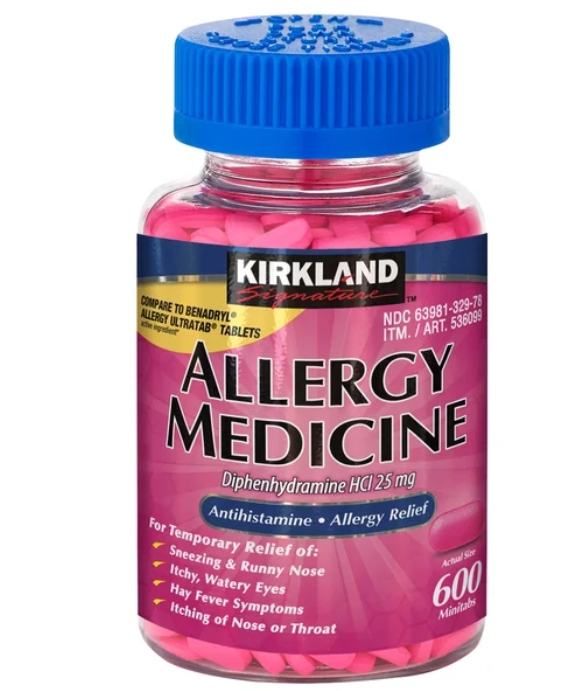
Kirkland Signature Allergy Medicine 25 mg., 600 Minitabs
- Antihistamine Allergy Relief
- Contains Diphenhydramine HCl 25mg.
- Compare to Benadryl Allergy Ultratab
Your Ultimate Companion Through Allergy Season and Beyond
Ah, springtime. The birds are chirping, flowers are blooming, and—for millions of Americans—noses are running and eyes are itching. If you’re among the unfortunate ranks of allergy sufferers, you know that finding effective, affordable relief can feel like searching for a needle in a haystack (a haystack that’s probably making you sneeze).
Enter Kirkland Allergy Medicine, a popular option that has garnered quite the following among cost-conscious consumers and allergy sufferers alike. But what exactly is this Costco brand medication, and does it live up to the hype? As someone who’s battled seasonal allergies for years, I’ve done the research so you don’t have to.
What Exactly Is Kirkland Allergy Medicine?
Kirkland Signature Allergy Medicine is Costco’s store-brand antihistamine designed to provide relief from common allergy symptoms including sneezing, runny nose, itchy throat, and watery eyes. Like many of Costco’s Kirkland Signature products, it aims to deliver the same efficacy as national brands at a significantly lower price point.
But don’t let the “store brand” label fool you. These aren’t second-rate medications. Kirkland’s pharmaceuticals are manufactured according to the same FDA standards as their name-brand counterparts. The difference? You’re not paying for expensive marketing campaigns or brand recognition.
The Science Behind the Relief: Active Ingredients
When examining any medication, the first question should always be: “What’s in it?” Kirkland actually offers two main varieties of allergy medicine, each with different active ingredients targeting the same symptoms.
The first version contains cetirizine hydrochloride (10mg), which is the same active ingredient found in Zyrtec. The second contains loratadine (10mg), which matches the active ingredient in Claritin. Both are second-generation antihistamines that block the action of histamine, a substance your body produces during an allergic reaction.
The key difference between these two ingredients lies in how they might affect you personally. Some people respond better to cetirizine, while others find loratadine more effective. It’s a bit like choosing between coffee brands—sometimes you just have to try both to find your perfect match.
Kirkland vs. The Big Names: Is It Really the Same?
“Is Kirkland just Zyrtec or Claritin in disguise?” This question pops up frequently, and the answer is both yes and no.
Yes, Kirkland’s allergy medicines contain the identical active ingredients as their name-brand counterparts (cetirizine in one version, loratadine in the other). The FDA requires generic medications to have the same active ingredients, strength, dosage form, and route of administration as their brand-name counterparts.
However, the inactive ingredients—binders, fillers, and coatings—might differ slightly. For most people, these differences are inconsequential. But if you have very specific sensitivities to certain inactive ingredients, it’s worth checking the complete ingredient list.
In my personal experience, I’ve found zero difference in effectiveness between Kirkland’s cetirizine tablets and Zyrtec. My nose doesn’t know the difference, but my wallet certainly does.
The Cost Factor: Why Budget-Conscious Allergy Sufferers Rejoice
Let’s talk dollars and sense. One of the most compelling reasons to choose Kirkland Allergy Medicine is the dramatic cost savings.
At Costco, you can typically find Kirkland Signature AllerClear (cetirizine) in a 365-tablet bottle for around $14-16. That’s approximately 4-5 cents per pill. The Kirkland Signature Aller-Fex (loratadine) is similarly priced.
Compare that to brand-name options: a 70-count bottle of Zyrtec can cost $35-45 (about 50-65 cents per pill), while Claritin runs about the same. That’s roughly a 90% savings with Kirkland’s version.
For year-round allergy sufferers, this price difference can translate to savings of over $150 annually. As someone who takes an antihistamine daily, switching to Kirkland has saved me enough money over the years to fund a weekend getaway—ironically, to a place with fewer allergens than my home city.
The Drowsiness Dilemma: Will It Make You Sleepy?
One of the biggest concerns with any allergy medication is whether it will leave you feeling like you need a nap by mid-afternoon. Both cetirizine (Zyrtec/AllerClear) and loratadine (Claritin/Aller-Fex) are marketed as “non-drowsy” options, but there are some nuances worth understanding.
Loratadine (the Claritin equivalent) is generally less likely to cause drowsiness than cetirizine. Studies suggest that about 2-3% of people taking loratadine experience some drowsiness.
Cetirizine (the Zyrtec equivalent) has a slightly higher chance of causing drowsiness, with approximately 8-14% of users reporting some level of sedation. It’s still much less sedating than first-generation antihistamines like Benadryl (diphenhydramine), which can leave up to 50% of users feeling sleepy.
In my case, cetirizine gives me the better allergy relief, and I’ve adapted by taking it before bed. By morning, any drowsiness has worn off, but the 24-hour protection remains. Your mileage may vary, however, which is why it’s worth experimenting with both to see which your body tolerates better.
Kid-Friendly Relief: Safety for the Little Ones
Watching a child struggle with allergies can be heartbreaking. Their discomfort is palpable, and as a parent, you want safe, effective relief—yesterday.
Is Kirkland Allergy Medicine appropriate for children? The answer depends on the specific product and your child’s age.
For the cetirizine version (similar to Zyrtec), the general guidelines are:
- Children 6 years and older: One 10mg tablet daily
- Children 2-5 years: Consult with a pediatrician (typically half a tablet)
- Under 2 years: Not recommended without medical supervision
For the loratadine version (similar to Claritin):
- Children 6 years and older: One 10mg tablet daily
- Children 2-5 years: Consult with a pediatrician
- Under 2 years: Not recommended without medical supervision
However—and this is important—Kirkland’s adult formulations are not specifically marketed for children. For younger kids, pediatric formulations of cetirizine or loratadine (often in liquid form with appropriate dosing) are generally recommended.
Always consult with your child’s pediatrician before starting any medication regimen. They can provide guidance specific to your child’s health history and needs.
The Timeline of Relief: How Quickly Does It Work?
When allergy symptoms hit hard, you want relief and you want it now. So how long before Kirkland Allergy Medicine kicks in?
For both cetirizine and loratadine formulations, you can generally expect:
- Initial relief: 1-2 hours after taking the first dose
- Maximum effectiveness: Approximately 8-12 hours after the first dose
- Full therapeutic effect: After 3-5 days of consistent daily use
This timeline explains why allergists often recommend starting your allergy medication a week or two before your typical allergy season begins. By building up the medication in your system, you’re better prepared when that pollen tsunami hits.
I’ve found that taking my cetirizine consistently for about a week yields the best results. The first dose helps, but that daily accumulation of the medication provides much more reliable relief when I’m in the thick of pollen season.
Dosage Details: Finding Your Perfect Regimen
The standard recommended dosage for both Kirkland cetirizine and loratadine products is one 10mg tablet taken once daily. This simplicity is part of their appeal—no complicated dosing schedules to remember.
However, there are a few considerations that might affect your personal dosing:
- Time of day matters: Some people experience more drowsiness with cetirizine and prefer taking it at night. Others find morning dosing works better for their symptoms.
- Consistency is key: These medications work best when taken at approximately the same time each day, maintaining steady blood levels.
- Food is optional: Both medications can be taken with or without food, making them convenient regardless of your eating schedule.
- Water is essential: Always take your allergy tablet with a full glass of water to help with proper absorption.
- Special populations: Older adults and those with kidney or liver impairment may need dosage adjustments. Consult your healthcare provider if you fall into these categories.
Remember, more is definitely not better when it comes to antihistamines. Doubling up on doses won’t enhance relief but will increase your risk of side effects.
Seasonal Allergies: Your Annual Battle Plan
When the trees begin their pollen party each spring, or ragweed runs rampant in the fall, Kirkland Allergy Medicine can be your first line of defense. Both cetirizine and loratadine are highly effective for managing seasonal allergic rhinitis, commonly known as hay fever.
The key to success with seasonal allergies is anticipation. Don’t wait until you’re miserable to start treatment. Consider these strategies:
- Start taking your Kirkland Allergy Medicine 1-2 weeks before your typical allergy season begins
- Continue daily throughout the season, even on days when symptoms seem mild
- Pair medication with environmental controls (keeping windows closed, using air purifiers, etc.)
- Track pollen counts in your area and increase vigilance on high-pollen days
I’ve found that the cetirizine version of Kirkland’s allergy medicine works particularly well for my spring tree pollen allergies, while some friends swear by the loratadine formulation for their fall ragweed sensitivities. Your specific allergen profile may respond differently, so some trial and error might be necessary.
Pet Allergies: Can Kirkland Help You Live with Fluffy?
For the 10-20% of the population allergic to dogs or cats, the question isn’t just about managing symptoms—it’s about maintaining relationships with beloved pets.
Can Kirkland Allergy Medicine help? The short answer is yes, but with caveats.
Both cetirizine and loratadine can reduce the histamine response triggered by pet allergens, helping to minimize symptoms like sneezing, itchy eyes, and congestion. However, they work best as part of a comprehensive approach:
- Regular pet bathing and grooming (ideally done by someone without allergies)
- HEPA air purifiers in main living areas
- Keeping pets out of bedrooms and off furniture
- Regular vacuuming with HEPA-filtered vacuums
I have a friend who was determined to keep her cat despite developing allergies. She found that taking Kirkland’s cetirizine daily, combined with weekly pet baths and a strict “no cats in the bedroom” policy, made coexistence possible. It wasn’t perfect, but it allowed her to maintain the bond with her feline companion.
The Drowsiness Question Revisited: Non-Drowsy, But Not for Everyone
While marketed as “non-drowsy,” the reality is slightly more nuanced. As mentioned earlier, cetirizine has a higher likelihood of causing some sedation compared to loratadine.
If you have a job requiring high alertness (pilot, surgeon, heavy machinery operator), or you’re particularly sensitive to medications, the loratadine formulation might be your safer bet. Always test your personal response to either medication on a day when you don’t need to drive or perform critical tasks.
Some users report that any initial drowsiness diminishes after taking the medication for several days, as their bodies adjust. Others find that taking the medication at night minimizes daytime drowsiness while still providing 24-hour symptom relief.
The Side Effect Spectrum: What to Watch For
Like all medications, Kirkland Allergy Medicine can cause side effects, though they’re generally mild and often diminish with continued use.
For cetirizine (Kirkland AllerClear), potential side effects include:
- Drowsiness (most common)
- Dry mouth
- Fatigue
- Headache
- Dizziness
- Nausea (uncommon)
For loratadine (Kirkland Aller-Fex), common side effects are:
- Headache
- Fatigue
- Dry mouth
- Nervousness (less common)
- Stomach pain (less common)
More severe side effects are rare with either medication but can include rapid heartbeat, confusion, or allergic reactions to the medication itself. If you experience any unusual symptoms, discontinue use and consult a healthcare provider.
In my experience, the dry mouth from cetirizine is the most noticeable side effect, but it’s easily managed by staying well-hydrated throughout the day.
Comparing to Benadryl: New Generation vs. Old Reliable
How does Kirkland Allergy Medicine stack up against the grandfather of antihistamines, Benadryl (diphenhydramine)?
The key differences lie in three areas:
- Duration: Kirkland’s options provide 24-hour relief with one dose, while Benadryl requires dosing every 4-6 hours.
- Sedation: Benadryl is significantly more sedating, with up to 50% of users experiencing drowsiness. In fact, it’s often sold as a sleep aid for this very reason.
- Blood-brain barrier penetration: First-generation antihistamines like Benadryl cross the blood-brain barrier more readily, leading to more central nervous system effects.
That said, Benadryl does have advantages in certain situations:
- It tends to work more quickly (30-60 minutes vs. 1-2 hours)
- It may be more effective for acute allergic reactions
- It’s available in more formulations (liquid, chewable, etc.)
I keep both in my medicine cabinet—Kirkland cetirizine for daily maintenance and Benadryl for those rare “emergency” allergy situations when I need faster, more aggressive relief.
No Prescription Needed: Over-the-Counter Convenience
One of the great advantages of Kirkland Allergy Medicine is its availability without a prescription. Both the cetirizine and loratadine formulations are FDA-approved for over-the-counter sale.
This accessibility means:
- No doctor appointments necessary for refills
- Ability to purchase when needed without delays
- Potential cost savings on copays and medical visits
However, just because it’s available without a prescription doesn’t mean you should skip the conversation with your healthcare provider. They can offer valuable guidance about integrating allergy medications into your overall health plan, especially if you have other medical conditions or take additional medications.
Dietary Considerations: Gluten-Free and Other Concerns
For those with celiac disease or gluten sensitivity, medication fillers and binders can be a concern. The good news is that Kirkland Allergy Medicine (both cetirizine and loratadine formulations) is generally considered gluten-free.
However, manufacturing processes can change, so it’s always wise to check the current packaging or contact Costco’s pharmacy directly if you have severe gluten sensitivity.
Other dietary considerations:
- Both versions are generally lactose-free
- Both are suitable for vegetarians (but may not be certified vegan)
- Neither contains significant amounts of sugar
As always, if you have specific dietary restrictions or sensitivities, review the complete ingredient list or consult with a pharmacist.
The Daily Question: Can You Take It Long-Term?
For those with year-round allergies, the question of long-term use is paramount. Can you safely take Kirkland Allergy Medicine daily for extended periods?
The scientific consensus is reassuring. Both cetirizine and loratadine have excellent safety profiles for long-term use. Studies have followed patients taking these medications daily for years without significant concerns.
Unlike some medications that lose effectiveness over time, second-generation antihistamines generally maintain their efficacy even with continued use. There’s typically no need for “drug holidays” or rotation between different antihistamines unless recommended by your healthcare provider.
My own allergist has confirmed that daily use of cetirizine is appropriate for my perennial allergies, and I’ve been taking it consistently for over five years without diminished effectiveness.
Beyond Sneezing: Help for Sinus Congestion?
Allergy sufferers know that nasal congestion can be one of the most frustrating symptoms. Does Kirkland Allergy Medicine help with this particular misery?
Both cetirizine and loratadine can provide some relief from congestion, but they’re not primarily decongestants. Their main mechanism works by blocking histamine, which helps more with sneezing, itching, and runny nose than with the stuffiness of congestion.
For more complete congestion relief, some strategies include:
- Combination products: Some formulations (not Kirkland’s standard versions) combine an antihistamine with a decongestant like pseudoephedrine.
- Supplemental treatments: Nasal saline rinses, steroid nasal sprays, or separate decongestants can complement your antihistamine regimen.
- Environmental modifications: Humidity control, allergen reduction, and elevation while sleeping can all help manage congestion.
In my experience, Kirkland’s cetirizine helps prevent the congestion from developing by stopping the inflammatory cascade, but once congestion sets in, I typically need to add a nasal spray for complete relief.
The Court of Public Opinion: What Reviews Say
The true test of any product lies in user experiences. So what do people say about Kirkland Allergy Medicine?
Overall, reviews are overwhelmingly positive, with most users citing:
- Comparable effectiveness to name brands
- Significant cost savings
- Convenience of the large-count bottles
Common criticisms include:
- Some users report more drowsiness compared to name brands (particularly with the cetirizine version)
- Pills are sometimes described as larger and harder to swallow than some competitors
- Some users report the medication becoming less effective over very long periods
On popular review sites, Kirkland’s allergy medications typically receive 4.5-4.8 out of 5 stars, with value and effectiveness being the most praised attributes.
Bulk Buying Benefits: Stocking Up at Costco
One of the signature advantages of Kirkland Allergy Medicine is the bulk packaging. Typically sold in bottles of 365 tablets (a full year’s supply), this format offers several benefits:
- Convenience: No monthly trips to the pharmacy or worries about running out
- Cost efficiency: The per-pill cost decreases significantly with the larger quantity
- Emergency preparedness: Always having medication on hand for unexpected allergy flare-ups
The standard packaging includes:
- Kirkland AllerClear (cetirizine): 365 tablets per bottle
- Kirkland Aller-Fex (loratadine): 365 tablets per bottle
For households with multiple allergy sufferers, these bulk packages are particularly economical. The medications have a shelf life of approximately 2-3 years when stored properly, making even the largest bottles practical for most families.
Beyond Respiratory: Skin Allergy Relief
While most associated with respiratory symptoms, antihistamines can also help with certain skin allergies and reactions. Both cetirizine and loratadine may provide relief for:
- Hives (urticaria)
- Itching from allergic reactions
- Some forms of atopic dermatitis
- Reactions to insect bites and stings
Cetirizine (the Zyrtec equivalent) is particularly well-regarded for skin symptoms, with some dermatologists preferring it for hives and other cutaneous allergic manifestations.
However, neither medication will address contact dermatitis (like poison ivy reactions) very effectively, and they’re not treatments for eczema or psoriasis. For these conditions, topical treatments are typically more effective.
I’ve found that Kirkland’s cetirizine helps calm the itching from mosquito bites remarkably well—an unexpected benefit during summer camping trips.
Making the Switch: Tips for Transitioning from Name Brands
If you’re considering switching from a name brand to Kirkland Allergy Medicine, here are some practical tips:
- Match the active ingredient: If you’ve been successful with Zyrtec, try Kirkland’s cetirizine formulation. If Claritin works for you, opt for their loratadine version.
- Don’t switch mid-crisis: Make the transition during a period when your allergies are under control, not during the height of allergy season.
- Give it time: Allow at least 5-7 days of consistent use before judging effectiveness, as these medications reach full efficacy after several days.
- Keep records: Note any differences in symptom control or side effects to discuss with your healthcare provider if needed.
- Don’t mix and match: Avoid taking multiple antihistamines simultaneously unless specifically directed by your healthcare provider.
My own transition was seamless—I simply finished my Zyrtec bottle and started the Kirkland cetirizine the next day. No adjustment period was needed, and the relief remained consistent.
Final Thoughts: The Value Proposition
After exploring every angle of Kirkland Allergy Medicine, the verdict is clear: for most allergy sufferers, it represents an exceptional value without compromising quality or effectiveness.
The combination of identical active ingredients to name brands, dramatic cost savings, and convenient bulk packaging makes a compelling case for making the switch. While individual responses can vary, the vast majority of users report satisfaction equivalent to much more expensive alternatives.
Whether you’re battling seasonal pollens, pet dander, or year-round indoor allergens, Kirkland’s options provide a cost-effective foundation for your allergy management strategy. By saving potentially hundreds of dollars annually without sacrificing relief, you’re making a smart healthcare choice that benefits both your symptoms and your wallet.
After all, the best allergy medicine isn’t just the one that works—it’s the one that works that you can actually afford to take consistently. For millions of allergy sufferers, Kirkland Allergy Medicine checks both those crucial boxes.




